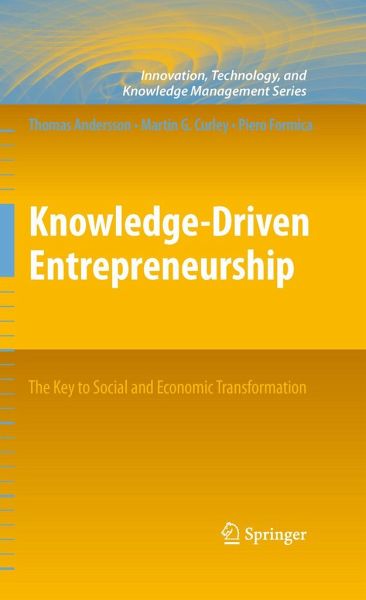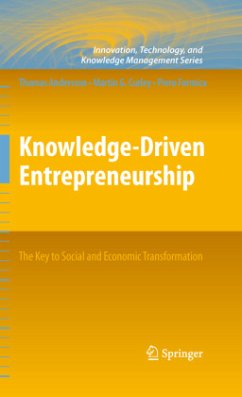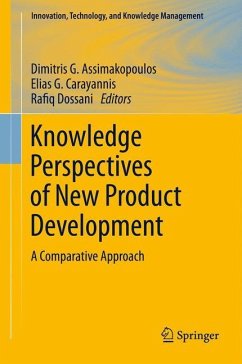
Knowledge-Driven Entrepreneurship
The Key to Social and Economic Transformation
Versandkostenfrei!
Versandfertig in 6-10 Tagen
76,99 €
inkl. MwSt.
Weitere Ausgaben:

PAYBACK Punkte
38 °P sammeln!
The current economic era, characterized by the rapid and global dissemination of information and capital, has been called the "knowledge age," the "entrepreneurial society," and the "intangibles economy," among other labels. Technological and productivity improvements continue to shift the emphasis from the mastery of physical assets (e.g., natural resources, factories) and physical tools (e.g., machines) to that of intangible assets (e.g., education, R&D projects, brands, patents) and socio-cultural tools (e.g., communities of knowledge practice) as the key to a community's economic prosperity. The purpose of this book is to build a bridge between knowledge and entrepreneurship, which have traditionally been separated by the walls of academic disciplines. Building on the pioneering work of Peter Drucker and William Baumol, the authors explore the intricate relationships among knowledge generation, innovation, new business creation, and the institutions that support them. Demonstrating direct links between the flow and application of knowledge, innovations in products and processes, the development of new enterprises, and generation of economic wealth, the authors strongly argue that these assets must be protected and sustained through national and regional institutions that encourage creativity and experimentation. Employing illustrative examples from around the world, the authors focus on the crucial role of societies to educate and support entrepreneurs and establish the right environment for new business development and rapid conversion of ideas into enterprises that contribute to economic growth and prosperity.
The Springer book series Innovation, Technology, and Knowledge Management was launched in March 2008 as a forum and intellectual, scholarly "podium" for global/local, transdisciplinary, transsectoral, public-private, and leading/"bleeding" -edge ideas, theories, and perspectives on these topics. The book series is accompanied by the Springer Journal of the Knowledge Economy, which was launched in 2009 with the same editorial leadership. The series showcases provocative views that diverge from the current "conv- tional wisdom," that are properly grounded in theory and practice, and that consider 1 2 the concepts of robust competitiveness, sustainable entrepreneurship, and demo- 3 cratic capitalism, central to its philosophy and objectives. More specifically, the aim of this series is to highlight emerging research and practice at the dynamic intersection of these fields, where individuals, organizations, industries, regions, and nations are harnessing creativity and invention to achieve and sustain growth. Books that are part of the series explore the impact of innovation at the "macro" (economies, markets), "meso" (industries, firms), and "micro" levels. (teams, indi viduals), drawing from such related disciplines as finance, organizational psychology, research and development, science policy, information systems, and 1 We define sustainable entrepreneurship as the creation of viable, profitable, and scalable firms. Such firms engender the formation of self-replicating and mutually enhancing innovation networks and knowledge clusters (innovation ecosystems), leading toward robust competitiveness (E.G. Carayannis, International Journal of Innovation and Regional Development, 1(3), 235-254, 2009).














